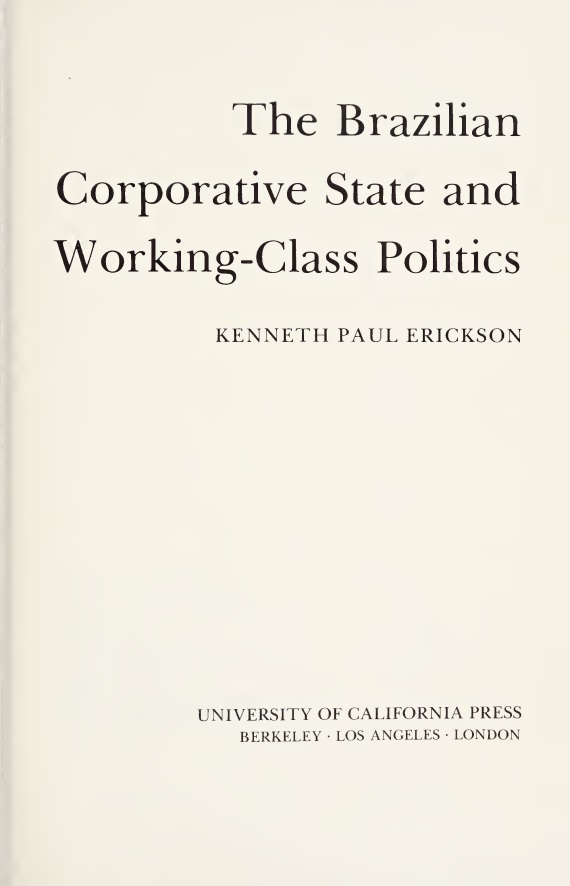Biblioteca / 1970-1979
Kenneth Erickson. The Brazilian Corporative State and Working-Class Politics.
Berkeley: University of California Press, 1977.
xvii, 225 páginas.

CONTENTS
PART I
CORPORATISM AND LABOR IN BRAZIL
1 – Introduction
The Rediscovery of Political Corporatism
Populism and the Weakening of Corporate Controls
2 – The Formation of the Corporative State in Brazil
The Old Republic
The Corporative Framework of the Estado Novo
3 – The Structural and Legal Foundations of Brazilian Labor Organization
Political Foundations of the Corporative Labor Law
Legal and Structural Foundations of the Labor System
Government Controls on Workers’ Organizations
Conclusion
PART II
THE MINISTRY OF LABOR IN THE CORPORATIVE STATE
4 – The Ministry of Labor in Brazilian Politics
The Ministers and the Politics of the Ministry
Ministry Finances and Ministry Performance
Conclusion
5 – The Labor Ministry Under Almino Afonso: A Case Study in Political Change
The Ministry’s Impact on National Politics in a Populist Period
Patronage: Traditional Means for a Radical End
Conclusion
PART III
THE POLITICAL POWER OF THE LABOR LEADERS
6 – Political Strikes in Brazil, 1960-1964: Strengths and Weaknesses of Organized Labor
Parity Strike, November 1960
Succession Crisis Strikes, August-September 1961
Cabinet Crisis General Strike, July 1962
General Strike over Plebiscite, September 1962
Santos Strikes, September 1963
Conclusion
7 – Labor Power in National Politics: The CGT Versus President Goulart
The Battle of Guanabara
Jango Undermines the CGT with the UST
Labor-Left Pressure on Goulart, August 1963
Social Security and Labor Confederation Elections, 1963-1964
Conclusion
PART IV
THE STATE AND LABOR SINCE 1964
8 – The Corporative System Since 1964: Modernizing the Estado Novo
Military Rule and Democratic Institutions: Unmaking the Populist System
Military Rule and the Corporative System: Modifications in the Labor Law After 1964
Labor’s Response
Conclusion
PART V
CONCLUSION
9 – Labor and the Political Process in Brazil
Labor Leaders and Political Power in Brazil
The Brazilian Political System
Change and Stability in a Corporative System
The Future of the Brazilian Political System
BIBLIOGRAPHY